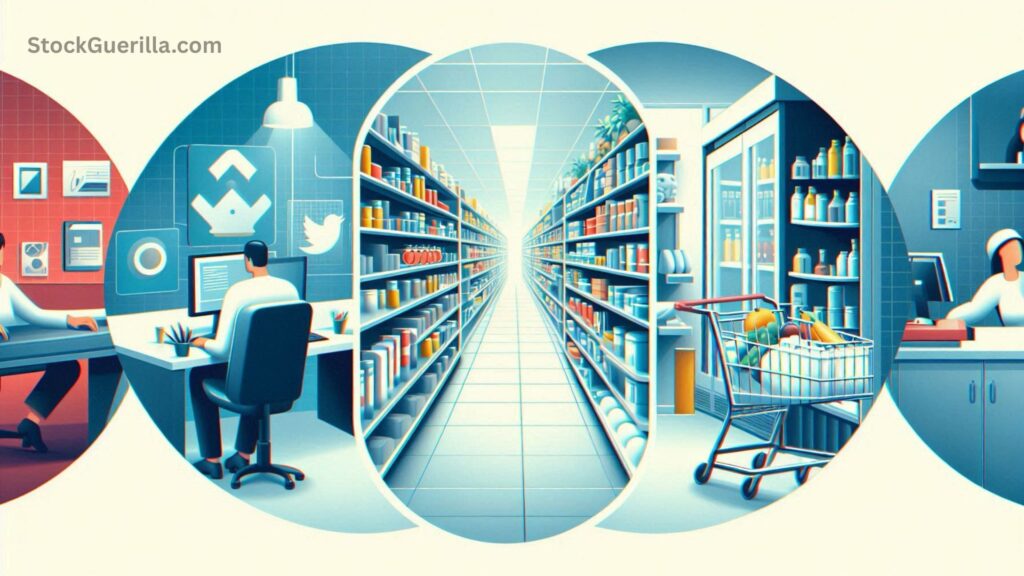What Sectors Perform Well During Economic Downturns?
Every economic downturn tells a story. When markets crash, panic often sets in, and investors scramble to protect their portfolios. Yet history shows us that not all industries suffer equally. Some sectors not only survive but actually thrive when the economy contracts.
The COVID-19 pandemic of 2020—often referred to as the “Great Lockdown”—was one of the most dramatic examples in recent history. While most businesses struggled, a handful of companies saw record growth. By looking at their performance, we can uncover which industries tend to do well when the economy takes a hit.
This guide will break down the sectors that historically perform well during recessions, why they stand out, and how investors can use this knowledge to build more resilient portfolios.
The “Great Lockdown” Crash
In the first quarter of 2020, the S&P 500 plunged, with only 32 companies (just 6% of the index) managing to post positive returns. That’s a staggering collapse.

But the rare winners had something in common: they provided products and services that became more essential as the pandemic disrupted daily life. This lesson extends beyond COVID—because while every recession is unique, certain needs remain constant.

Also Read: How to Save for Retirement in Your 30s?
Top 10 Best-Performing S&P 500 Stocks in Q1 2020
Here’s a snapshot of the companies that thrived during the chaos:
| Company Name | Q1 2020 Return | Sector |
|---|---|---|
| Regeneron Pharmaceuticals (REGN) | +30.04% | Healthcare |
| Citrix Systems (CTXS) | +28.02% | Information Technology |
| NortonLifeLock (NLOK) | +25.38% | Information Technology |
| Digital Realty Trust (DLR) | +17.02% | Real Estate |
| Gilead Sciences (GILD) | +16.19% | Healthcare |
| Netflix (NFLX) | +16.05% | Communication Services |
| Clorox (CLX) | +13.60% | Consumer Staples |
| SBA Communications (SBAC) | +12.22% | Real Estate |
| MSCI Inc. (MSCI) | +12.16% | Financials |
| NVIDIA (NVDA) | +12.10% | Information Technology |
Observation: While most companies bled value, these stocks held steady or gained because they were tied to essential needs, digital transformation, or crisis-related demand.
What These Stocks Had in Common
🏥 Healthcare: A Non-Negotiable Expense

Healthcare demand is famously price inelastic—people need medical treatment regardless of the economy. During COVID, biotech giants like Regeneron and Gilead Sciences surged as they raced to develop treatments.
But the resilience of healthcare isn’t limited to pandemics. Prescription drugs, medical devices, and hospital services remain critical in every downturn. Still, not all healthcare firms are safe bets—avoid highly leveraged startups without stable revenue streams. Look for companies with strong balance sheets, recurring revenue, and established pipelines.
💻 Information Technology: The Backbone of Modern Life
The pandemic accelerated a long-term trend: our reliance on technology.
- Citrix Systems gained as companies rushed to support remote work.
- NortonLifeLock benefited from increased demand for cybersecurity.
- NVIDIA rode the wave of gaming and home computing.
In recessions, tech can behave in two ways: as a growth driver (fueling innovation) or as a defensive play (providing essential digital infrastructure). The key is to focus on firms that deliver indispensable services—cloud computing, cybersecurity, and semiconductors.
🏢 Real Estate: Not All REITs Are Equal
Real estate often struggles in recessions, especially sectors tied to retail malls or office buildings. Yet two REITs—Digital Realty Trust and SBA Communications—thrived in 2020.
Why? Because they owned data centers and telecom towers, critical assets in a digital-first world.
Lesson: Real estate’s performance depends on the subsector. While hospitality and commercial real estate are vulnerable in downturns, infrastructure-linked REITs can provide resilience and growth.
📺 Communication Services: Entertainment Becomes Essential
Netflix turned out to be the unexpected star of the lockdown era. With people confined to their homes, subscription numbers skyrocketed.
This highlights a broader truth: during stressful times, affordable entertainment remains in demand. Just as movie theaters once thrived during the Great Depression, today’s digital platforms become “comfort services” that consumers are reluctant to cut.
🧼 Consumer Staples: Everyday Essentials
If there’s one sector that consistently weathers economic storms, it’s consumer staples.
In 2020, Clorox saw record sales as disinfectants flew off the shelves. Grocery chains like Kroger and household brands like Colgate and General Mills also held strong.
These companies sell must-have goods: food, hygiene products, cleaning supplies. Since households can’t skip toothpaste, toilet paper, or cereal, revenue streams stay stable. This makes consumer staples one of the most reliable defensive sectors.

Also Read: What are the Benefits of Automating Your Savings?
Not All Recessions Are Alike
It’s tempting to assume the same playbook applies to every downturn—but that’s not always the case.

- 2008 Financial Crisis: Banks and real estate collapsed, while utilities and consumer staples held up.
- 2020 Pandemic: Healthcare, tech, and streaming services thrived because of unique lockdown dynamics.
- Future Recessions: Outcomes may hinge on government policies, inflation trends, or global supply chain shocks.
👉 The takeaway: focus on sectors that meet essential needs and adapt to societal changes.

Also Read: How to Start Investing with Little Money?
Actionable Investment Tips During Recessions
- Diversify across resilient sectors—don’t overconcentrate in one industry.
- Evaluate balance sheets—favor companies with low debt and positive cash flow.
- Look for “essential providers”—healthcare, food, utilities, and tech infrastructure.
- Avoid speculative plays—high-growth firms with no profitability struggle when credit tightens.
- Think long-term—buying strong companies during downturns can set you up for recovery gains.
Final Thought
Economic downturns are never easy, but they aren’t the end of opportunity. The lesson from 2020—and recessions before it—is clear: sectors that serve essential needs, enable digital transformation, or provide affordable comforts tend to do best.
Instead of panicking when markets fall, smart investors look for resilient companies with strong foundations. By focusing on the right sectors, you can safeguard your portfolio and even position yourself for growth when the recovery begins.
FAQs About Investing in Recessions
Q1. What industries are considered “recession-proof”?
Healthcare, consumer staples, and utilities are traditionally seen as recession-resistant.
Q2. Are tech stocks safe during downturns?
Not all. Essential service providers like cloud computing and cybersecurity firms are more resilient than speculative startups.
Q3. Do real estate investments do well in recessions?
Some REITs tied to data centers or telecom infrastructure perform well, while office and retail REITs may suffer.
Q4. Should I avoid the stock market during a recession?
Not necessarily. Downturns often create opportunities to buy quality companies at discounted prices.
Q5. How do consumer habits change in recessions?
Spending shifts toward essentials (food, medicine, utilities) and affordable entertainment, while luxury and discretionary purchases decline.




Post Comment